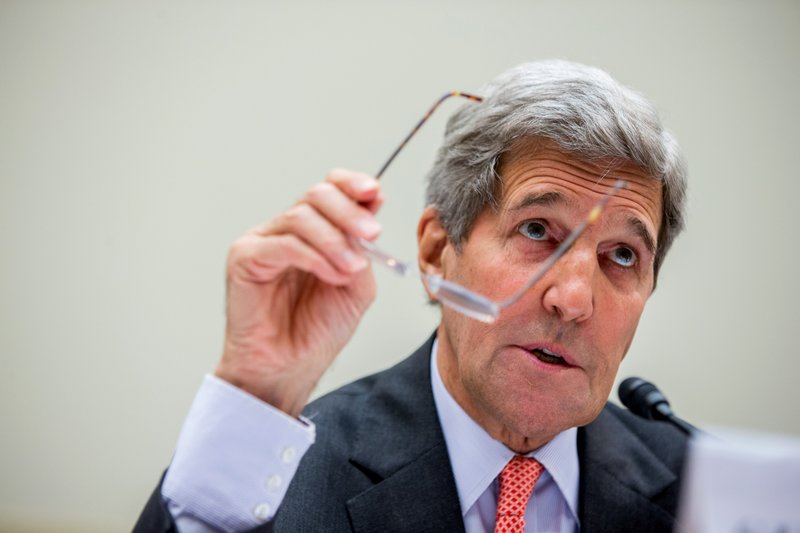WASHINGTON -- Secretary of State John Kerry sparred Tuesday with the lone Democratic senator to publicly oppose the Iran nuclear deal, saying there was no way the U.S. could prevent American allies from doing business with Tehran if Congress were to reject the agreement.
Sen. Chuck Schumer disagreed and suggested Washington still could force the world to isolate the Iranians until they make deeper nuclear concessions.
If Congress were to shelve the deal -- and override an expected presidential veto -- it could severely complicate the government's ability to honor its commitments to roll back economic sanctions on Iran. In exchange, Iran has agreed to a decade of tough restrictions on its nuclear program.
Many Republicans voiced opposition to the agreement.
Addressing a Reuters Newsmaker event in New York, Kerry took aim at those in Congress who say a better deal could still be reached. That argument would entail the U.S. maintaining or increasing pressure on Iran by threatening foreign governments and businesses for trading with Tehran or buying Iranian oil.
Now that the pact has been finalized, Kerry said, such an approach was no longer an option.
"Are you kidding me?" he asked the crowd. "The United States is going to start sanctioning our allies and their banks and their businesses because we walked away from a deal? And we're going to force them to do what we want them to do, even though they agreed to the deal we came to?"
Kerry warned of severe consequences for pursuing such an approach after the agreement has been accepted by Iran and fellow negotiating countries Britain, China, France, Germany and Russia. It also was endorsed by all 15 members of the U.N. Security Council.
Kerry said European governments could walk away from the U.S.-led sanctions strategy against Russia, that the U.S. and Israel would have no support for military action against Iran if such action were necessary and that the U.S. dollar would lose its status as the reserve currency of the world.
The top American diplomat also challenged those who have criticized the length of the deal's restrictions on Iranian enrichment of material that can be used in nuclear warheads and other elements of its program.
He suggested it was illegitimate to worry that Iran would be a "nuclear threshold nation" in 15 or 20 years, because it already is one today. "They became that while we had a policy of no enrichment," he said, referring to the continued demand of Republicans and Israeli Prime Minister Benjamin Netanyahu.
"We will have left Iran free to go do its program, without restraints, without inspections, without knocking down its stockpile, without knowing what they're doing," he said.
Echoing Kerry's case, 36 retired generals and admirals released an open letter Tuesday urging Congress to back the deal.
Calling the agreement "the most effective means currently available to prevent Iran from obtaining nuclear weapons," the letter said that gaining international support for military action against Iran, should that ever become necessary, "would only be possible if we have first given the diplomatic path a chance."
Signers of the letter include retired general and flag officers from every branch of service. They include four-star Marine Gens. James Cartwright, former vice chairman of the Joint Chiefs of Staff, and Joseph Hoar, former head of the U.S. Central Command; and Gens. Merrill McPeak and Lloyd Newton of the Air Force.
Retired Navy Rear Adm. Harold Robinson, a Jewish rabbi and former naval chaplain who currently leads the National Conference on Ministry to the Armed Forces, also signed.
"Military action would be less effective than the deal, assuming it is fully implemented," the letter said. "If the Iranians cheat, our advanced technology, intelligence and the inspections will reveal it, and U.S. military options remain on the table. And if the deal is rejected by America, the Iranians could have a nuclear weapon within a year. The choice is that stark."
Robinson said he decided to speak out to demonstrate that "those of us who love Israel in the United States are not of one mind and one voice on this matter. I thought it was important to represent some of the diversity within the American Jewish community."
Kerry's comments came shortly after Schumer told reporters why he decided last week to oppose the agreement.
Even if the U.S. were to back away and other countries lifted their sanctions, he said, "powerful" secondary sanctions would prevent many foreign governments from doing business with Iran and force them into new negotiations. He cited the French oil company Total as one that would suffer if it dealt with Iran, as it would be locked out of the U.S. market.
"We have that powerful tool, and if used, I think that's a better, better chance in a very difficult world than an agreement that is so totally flawed," Schumer said.
Schumer was asked by reporters whether he will lobby colleagues to vote with him.
"Certainly, I'm going to try to persuade my colleagues that my viewpoint is right, but anyone who thinks you can force somebody to vote with you in the Senate doesn't understand the Senate," he said. "This is a vote of conscience. It was a vote of conscience for me. It will be a vote of conscience for my colleagues."
Information for this article was contributed by Bradley Klapper, Deb Riechmann and David B. Caruso of The Associated Press and by Karen DeYoung of The Washington Post.
A Section on 08/12/2015
